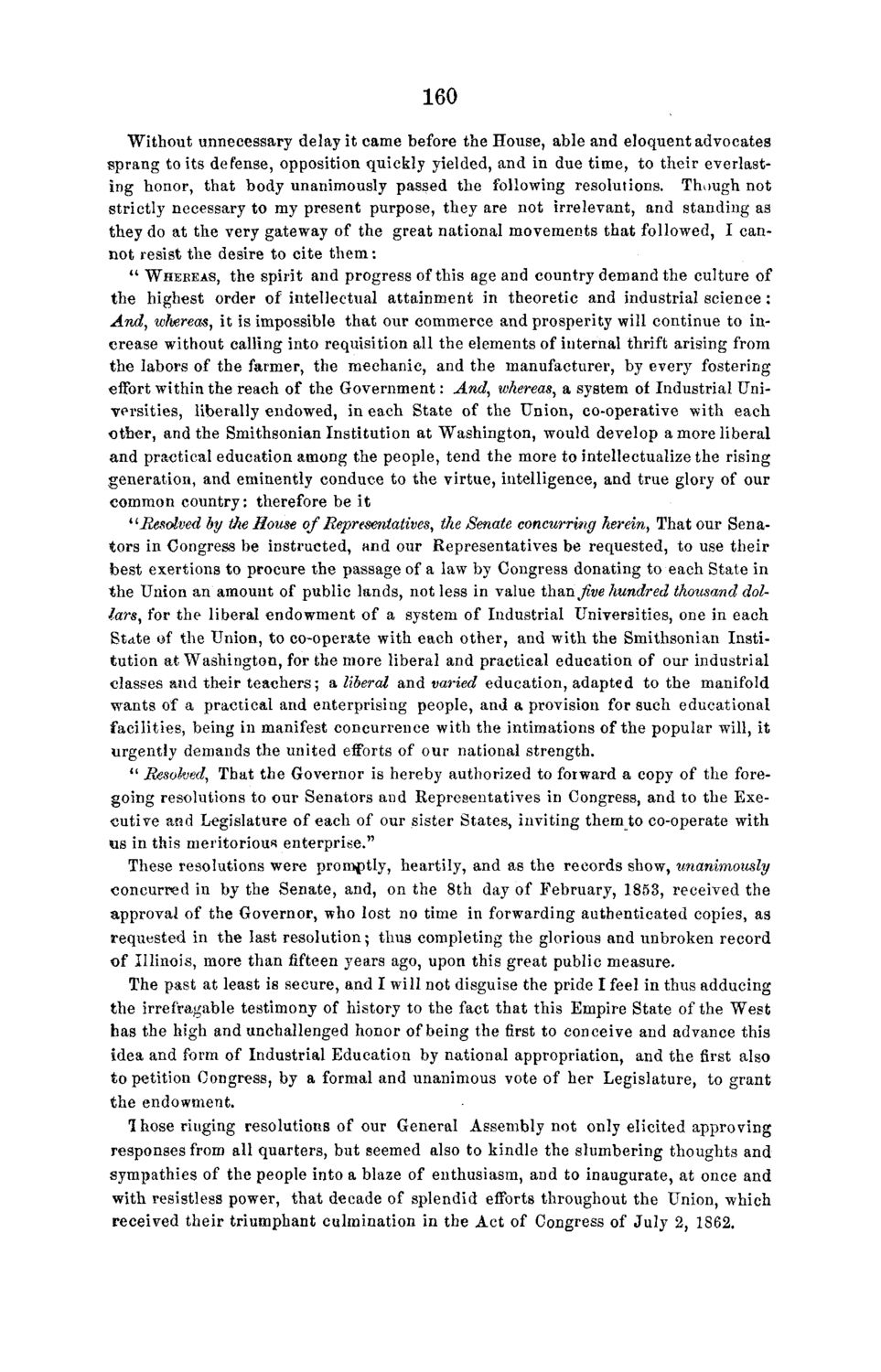| |
| |
Caption: Board of Trustees Minutes - 1868
This is a reduced-resolution page image for fast online browsing.

EXTRACTED TEXT FROM PAGE:
160 Without unnecessary delay it came before the House, able and eloquent advocates sprang to its defense, opposition quickly yielded, and in due time, to their everlasting honor, that body unanimously passed the following resolutions. Though not strictly necessary to my present purpose, they are not irrelevant, and standing as they do at the very gateway of the great national movements that followed, I cannot resist the desire to cite them: " WHEEEAS, the spirit and progress of this age and country demand the culture of the highest order of intellectual attainment in theoretic and industrial science : And, whereas, it is impossible that our commerce and prosperity will continue to increase without calling into requisition all the elements of internal thrift arising from the labors of the farmer, the mechanic, and the manufacturer, by every fostering effort within the reach of the Government: And, whereas, a system of Industrial Universities, liberally endowed, in each State of the Union, co-operative with each other, and the Smithsonian Institution at Washington, would develop a more liberal and practical education among the people, tend the more to intellectualize the rising generation, and eminently conduce to the virtue, intelligence, and true glory of our common country: therefore be it "Resolved by the Mouse of Representatives, the Senate concurring herein. That our Senators in Congress be instructed, and our Representatives be requested, to use their best exertions to procure the passage of a law by Congress donating to each State in the Union an amount of public lands, not less in value than five hundred thousand dollars, for the liberal endowment of a system of Industrial Universities, one in each State of the Union, to co-operate with each other, and with the Smithsonian Institution at Washington, for the more liberal and practical education of our industrial classes and their teachers; a liberal and varied education, adapted to the manifold wants of a practical and enterprising people, and a provision for such educational facilities, being in manifest concurrence with the intimations of the popular will, it urgently demands the united efforts of our national strength. " Resolved, That the Governor is hereby authorized to forward a copy of the foregoing resolutions to our Senators and Representatives in Congress, and to the Executive and Legislature of each of our sister States, inviting them to co-operate with ws in this meritorious enterprise." These resolutions were promptly, heartily, and as the records show, unanimously concurred in by the Senate, and, on the 8th day of February, 1853, received the approval of the Governor, who lost no time in forwarding authenticated copies, as requested in the last resolution; thus completing the glorious and unbroken record of Illinois, more than fifteen years ago, upon this great public measure. The past at least is secure, and I will not disguise the pride I feel in thus adducing the irrefragable testimony of history to the fact that this Empire State of the West has the high and unchallenged honor of being the first to conceive and advance this idea and form of Industrial Education by national appropriation, and the first also to petition Congress, by a formal and unanimous vote of her Legislature, to grant the endowment. Ihose ringing resolutions of our General Assembly not only elicited approving responses from all quarters, but seemed also to kindle the slumbering thoughts and sympathies of the people into a blaze of enthusiasm, and to inaugurate, at once and with resistless power, that decade of splendid efforts throughout the Union, which received their triumphant culmination in the Act of Congress of July 2, 1862.
| |